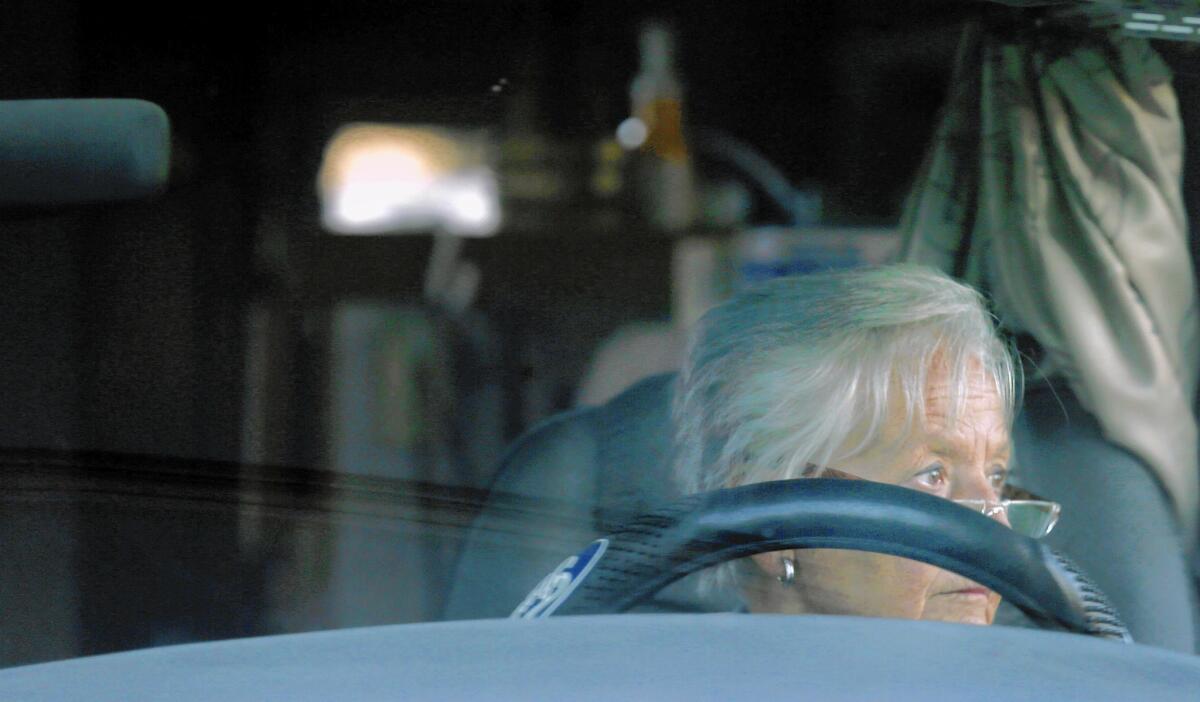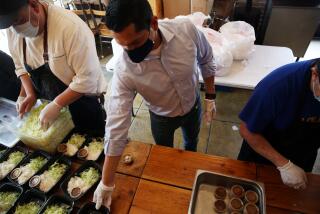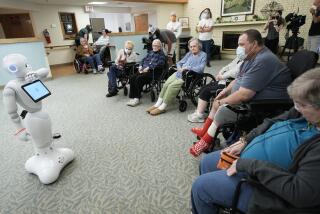Too poor to retire and too young to die

At the wise age of 79, Dolores Westfall knows food shopping on an empty stomach is a fool’s errand. On her way to the grocery store last May, she pulled into the Town & Country Family Restaurant to take the edge off her appetite.
After much consideration, she ordered the prime rib special and an iced tea — expensive at $21.36, but the leftovers, wrapped carefully to go, would provide two more lunches.
The problem, she later realized, was that a big insurance bill was coming due. How was she going to pay it? Was she going to tip into insolvency over a plate of prime rib?
“I thought I could handle eating and shopping,” she said, “but lunch put me over the top.”
Westfall — 5 feet 1 tall, with a graceful dancer’s body she honed as a tap-dancing teenager — is as stubborn as she is high-spirited. But she finds herself these days in a precarious place: Her savings long gone, and having never done much long-term financial planning, Westfall left her home in California to live in an aging RV she calls Big Foot, driving from one temporary job to the next.
She endures what is for many aging Americans an unforgiving economy. Nearly one-third of U.S. heads of households ages 55 and older have no pension or retirement savings and an annual income under $19,000.
A growing proportion of the nation’s elderly are like Westfall: too poor to retire and too young to die.
Many rely on Social Security and minimal pensions, in part because half of all workers have no employer-backed retirement plans. Eight in 10 Americans say they will work well into their 60s or skip retirement entirely.
Westfall hadn’t planned to keep working. But in 2008, as the U.S. economy spasmed, she lost her home and tumbled out of the middle class.
Today, Westfall is one of America’s graying nomads. Although many middle-class retirees ply the interstates in Winnebagos as a lifestyle choice, for Westfall and many others, life on the move is not as much a choice as a necessity.
Her seven-year journey has taken Westfall to 33 states and counting. She’s worked as a cavern tour guide, resort receptionist, crowd control officer, hustling clerk at an Amazon warehouse. Others like her have cleaned toilets, picked beets, plucked chickens.
Her monthly income consists of $1,200 in Social Security and a $190 pension, plus pay from her seasonal jobs. She owes $50,000 on her credit cards. There’s also a $268 monthly loan payment for her aging rig.
There have been times when she has survived on brown rice and milk — and worried the milk would run out.
Westfall spent the Christmas season of 2014 working at a Fort Lauderdale, Fla., mall for $10 an hour, then hit Virginia for a stint selling photos door-to-door on commission. By May 2015, she brought her roadshow into the Darien Lake Theme Park in upstate New York for a job as a kiddie ride operator. The pay: $9 an hour. The job would carry her only through September.
She untethered from Big Foot the tiny white Smart car she calls Little Tow and set up camp in a field among two dozen other seasonal workers, nearly all of them retirement age. Wearing an electric orange work shirt, she’d soon become known among youngsters there as “the Ride Lady.”
Nearing 80, she suffers daily aches and pains — leg cramps and arthritis and weakness from low blood sugar. Big Foot has its own problems: The roof leaks, so do the pipes beneath the sink. The water pump feeding the shower and sink is failing. “One of us is going to give out first,” Westfall said with a laugh. “It’s either me or Big Foot.”
She avoided disaster after the prime rib dinner by persuading the insurance company to space out her payment in installments. But then that same month, she was caught driving 43 mph in a 35-mph zone. The ticket: $300.
“I could just cry,” she wrote in her journal. “I won’t have earned $300 in all of May. If I can get it lowered to $150, it will still be more than my entire grocery budget. Don’t know how I’m going to manage it.”
::
For weeks in the spring of 2008, Westfall lingered alone inside Big Foot, parked outside her double-wide trailer in a mobile home park in Kelseyville, a rural town in Northern California.
The furniture was sold, the mobile home up for sale, and Westfall was living in the driveway. She thought about killing herself.
“I had a serious out-loud talk with myself,” she recalled, about how to get out of her financial fix — an unforeseen downturn in a long and independent life.
The New York City native had put herself through business school and had spent time as a bank executive secretary and a museum curator. She’d later started her own interior design consulting firm. That’s when she bought Big Foot, using it as a mobile office to meet clients across California.
Westfall didn’t know it, but she was perched on the fault line of an economic temblor: In a few months, U.S. housing prices would record their largest drop in history.
The Great Recession would hit older Americans hard. Of the 4.7 million home foreclosures from 2007 to 2011, one-third, or 1.5 million, involved people ages 50 and older. Studies show that older single women are the most vulnerable: They make less than male workers, and those that take time off to have children often miss chances for seniority and pay raises.
Westfall married twice decades ago but never had children, deciding she was at her loneliest with a man in her life. After her retirement in 2007, she had planned on selling the double-wide to finance a lifelong dream: touring the nation from behind the wheel of Big Foot.
She knew the move would be a stretch. The financial fallout had rendered her modest stock portfolio worthless, and she’d never put away much in savings.
The mobile home was worth $40,000, but there was a catch: The trailer park’s new owner had tripled the rent, making it impossible to sell her unit. She reached out to the local senior law center, even her county supervisor, scrambling for a solution.
It was around this time in 2008 that Sheila Faulds died; she’d been a friend of Westfall’s for half a century and she left her $20,000. “Promise me you won’t pay bills with the money,” Faulds had told her. “I want you to buy a car.”
Westfall’s journal oozed despair: Her best friend was gone. And she was stuck: How could she hit the road without selling her double-wide? Her skin flushed with hives. She couldn’t sleep.
“I burst into tears and had a big long whopping cry,” she wrote in her journal. Then she pounded her fists on the sofa until she fell asleep.
She awoke to this thought: There was another option.
With a pad and pencil, she produced a pro-and-con ledger to assess her predicament. On one side of the page, under “Bad,” she wrote, “No money. No job. Insufficient income. Big debt. No place to go. No plans.”
Under “Good”: “Motor home to live in (though part of the debt). Ability to make plans.”
Then she made another two-sided list. One column read, “What have I always wanted to do in retirement?” The other: “How close can I get to it?”
She could hit the road, but she would have to keep working. And just maybe, there might be money for a few nice things. It was all so scary but also a little exciting.
Westfall sold off most of what was left of her belongings and put the rest in storage. Her friend’s gift would launch her life as a road gypsy, and she would leave the double-wide behind without getting a dime for it.
She started Big Foot’s engine, drove down the blacktop driveway and turned right, heading south onto Soda Bay Road and a life as a tumbleweed on wheels.
“I’m not sure if I even closed the gate behind me,” she recalled. “I just drove away.”
::
Westfall has long been used to being on her own. In her youth she took solitary road trips into the desert and mountains and once took flying lessons. But life on the road taught her to be more resourceful, bolder.
She once raced north out of Texas to escape a hurricane and rode out the remnants of the storm at a truck stop in Little Rock, Ark. One Christmas in Florida, she scared off a would-be armed robber who accosted her at an ATM, yelling, “I haven’t got any more money, fool!”
Last summer, a few weeks after getting the speeding ticket, Westfall stood in traffic court to fight the $300 fine. She persuaded the judge to reduce it to $75 — but missed a day’s pay to plead her case.
Two months later, in August, she still didn’t know where she’d be working after Darien Lake, and faced yet another nasty choice between need and want.
Should she go to the dentist, or take a guided tour of buildings designed by her favorite architect, Frank Lloyd Wright? Each cost $100.
She picked Frank Lloyd Wright. Her teeth could wait.
“I believe doing something fun, no matter how frivolous it might seem, is food for the soul,” she said. “You need to feed yourself some pleasure once in a while to keep feeling alive. Otherwise, it’s just drudgery.”
But there is little money to see the sights. She earns too much to receive food stamps, and a lot of it goes to groceries. She tries to eat organic food, with her low blood sugar. That rules out cheap but filling Big Macs — as well as the food kitchens whose mass-produced meals, she decided, are unhealthful.
She can’t buy in bulk because Big Foot has little storage space. Often, she’s forced to purchase smaller-sized products — at convenience store prices — that fit a smallish RV refrigerator. At laundromats, she tries to keep wash day under $10, always scouting the hotter money-saving dryers.
Her key ring is crowded with plastic discount tags for supermarkets and places like Staples and Books-A-Million.
But Westfall finds that she is now more in debt than when she hit the road. She hasn’t been able to visit her younger sister, Mary Ann, in California since she set out; she can afford to take only the shortest route to the next job, and the jobs haven’t taken her that way. The biggest blow came in 2013 when she faced $8,000 in charges for emergency dental work and rig repairs. It was a gut punch from which she has yet to recover.
She tries to do the repairs herself when she can. One day at Darien Lake, she climbed a ladder to lean over the RV’s roof, looking for the source of a leak that was dripping water onto her laptop. Time was, she’d climb all the way up on the roof to take care of things. But not anymore.
“I’m beginning to feel ineffectual,” she said. “And I’ve never felt that before. I don’t feel desperate, but I’m getting close.”
::
Westfall was working her last shift at the theme park on a warm Sunday afternoon in late September. While some co-workers slouched glumly at the controls, she was a blur of activity. Using a stick, she measured each tyke to make sure they were tall enough to ride; she strapped the youngest ones in tightly.
Wearing the leopard-spotted glasses she’d bought at a truck stop, she stooped face-to-face with little ones for conversations that never condescended. Some wrapped her in a spontaneous hug.
They’d ask, “Did you get your glasses at Target?” or “Are you nice?”
Her favorite: “How did you get so old?”
She responded, “By hanging around a really long time.”
Her feet hurt constantly from standing 12 hours at a stretch, six days a week, racking up overtime. On her last day, an hour before the park would begin to shut down for the year, Westfall gently corrected a mother who’d barged into the ride area to check on her child after the security gate was closed. That was her job, Westfall explained.
The mother exploded. She shouted inches from Westfall’s face, spittle flying.
“Just because you’re a miserable old lady with your effing $7-an-hour job,” she hissed. “You don’t have a life!”
As the irate woman was finally escorted away by security, a bystander sent her daughter over with a $10 bill. She said Westfall deserved a nice dinner.
An hour later, Westfall walked to her car, exhausted and preoccupied: She still had not lined up her next job. Suddenly, a small crowd rushed the vehicle, and Westfall tensed: the irate mother again?
It was six teenagers she’d worked with that summer. They rocked her car back and forth, chanting, “We love Dolores! We love Dolores!”
The youngsters pulled Westfall out for a group hug and invited her to Denny’s for a going-away dinner. Her face flushed at this gift of grace. At the restaurant, she laughed along with high schoolers that in another life could have been her grandchildren.
After a waitress dropped off the check, a manager approached and put a hand on Westfall’s shoulder. “So, you’re going to pay for the whole crew?”
The group ignored him and divvied up the bill. Westfall’s portion came to $10; Her AARP card cut the damage to $8 and change.
She walked into the night feeling less alone. Later, she sat at the picnic table next to her rig, one she’d cozied up with a red-and-white plastic tablecloth.
::
Most of the RVs belonging to other seasonal workers had already departed. On a gray October morning, a flock of geese flew in formation overhead, and Westfall knew she’d have to flee too. Big Foot could never keep her warm in winter, but she couldn’t travel too far south; she knew from experience that south Florida was too expensive.
But where to go? Despite hours of phone work, Westfall still didn’t know whether she was heading to Maryland for a door-to-door sales gig or to Georgia for a mall kiosk job.
Big Foot was another problem. The roof still leaked, and the plumbing was acting up. Thanks to a surprise $1,000 limit increase on one credit card, she had a bit of headroom, but $400 of that was already spent.
The deadline for leaving Darien Lake was the next day. She turned on the kitchen faucet. Water collected in the sink.
A flash of weariness crossed her face. “I don’t like this,” she said.
Westfall, in a brown house robe, began once again storing her life for the next move. The driver and passenger seats and floor were stacked with boxes marked “writing,” “receipts,” “credit cards” and “insurance.”
She emerged from the bathroom looking glum: The foot pedal toilet flusher had just broken.
Soon a security guard knocked.
“Hi,” he said. “I just wanted to know when you plan on leaving.”
“Oh, in about a year,” Westfall said with a laugh. “You know, packing one of these is like putting your house on wheels.”
As the afternoon waned, she finished organizing and moved outside. Winding up several hoses, her fingers ached in the cold. Then a brace on the rig’s stairwell snapped. In frustration and despair, she banged on Big Foot’s side.
“You’re getting damned uninhabitable,” she scolded.
With the sun sinking, Westfall drove to a repair shop.
The mechanics confirmed the busted water pump. Without it, she couldn’t save money by parking at truck stops and would have to pay to stay at campgrounds with water hookups.
But the mechanics wanted thousands for the repair. So Westfall did without it, scouting half-price campgrounds while hopscotching south to the Carolinas, where she found a mechanic to fix the pump for $200.
By late October, she was parked at a campsite in Savannah, Ga., her Christmas season working grounds. She was entering her eighth year on the road, ready to start the entire process all over again.
Dinner was back to brown rice and milk. Big Foot’s kitchen sink still drained slowly.
More to Read
Start your day right
Sign up for Essential California for news, features and recommendations from the L.A. Times and beyond in your inbox six days a week.
You may occasionally receive promotional content from the Los Angeles Times.







